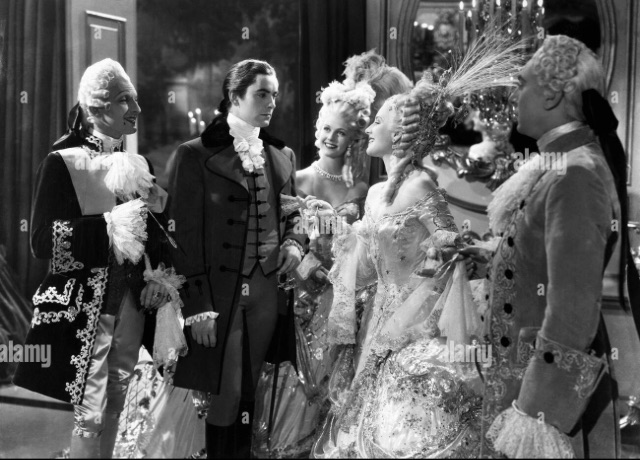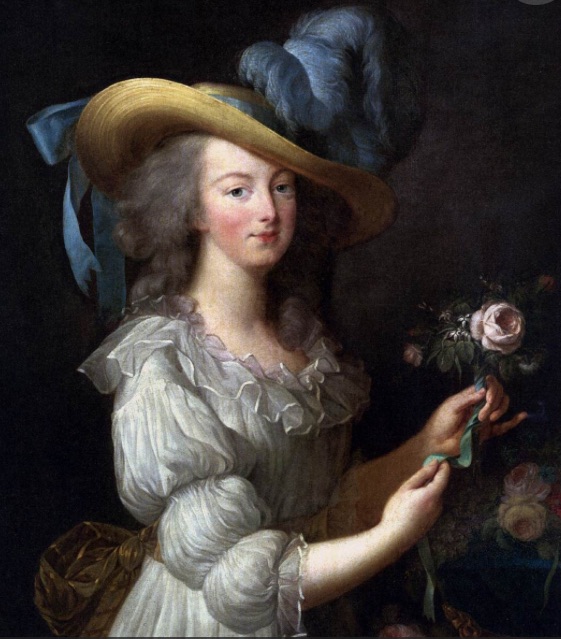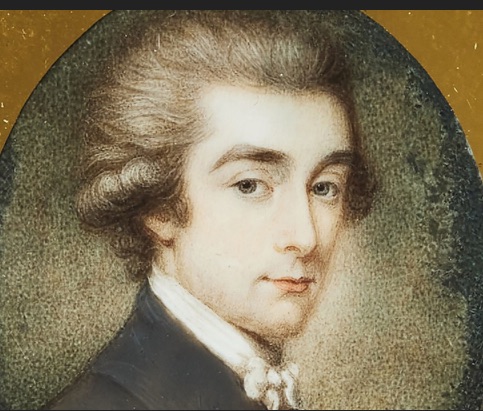A romantic drama during the French Revolution
In 1979, I had a major transformational experience when I was tasked by my sister to record an old black and white movie onto a 2.5 hour “beta” video tape. The movie was on TV late at night, and I would need to edit out all the commercials for the long movie to fit on the tape.
Having recently completed my Junior year at Palo Alto High School, I wasn’t particularly interested in the French Revolution or in depth studying of history. Certainly, I was not a person who was captivated by the idea of a love so strong that it would cause one to risk sacrificing their life for another.
It was 11:30 pm on June 30th, 1979 when I got comfortable on the couch of our darkened living room to begin editing the recording of the 1938 MGM classic “Marie Antoinette.” It starred a famous actress who I had never heard of named Norma Shearer as Marie Antoinette, an Austrian princess who become Queen of France. A famous leading man, Tyrone Power, played Count Axel von Fersen of Sweden. Based on a biography about Marie Antoinette by author Stephen Zweig, the film portrayed real life characters in a love affair in the midst of one of the most tumultuous and bloody periods of world history.
Quite frankly, I was just hoping I wouldn’t fall asleep and ruin the recording for my sister.
SPOILER ALERT: IN CASE YOU PLAN ON READING OR VIEWING A BIOGRAPHY OF MARIE ANTOINETTE, THIS ARTICLE WILL REVEAL IMPORTANT HISTORICAL DETAILS IN AN OTHERWISE SUSPENSE FILLED STORY.

Up until this point of my life, my interests were dominated by working on cars and dating girls (and wanting to date girls), cruising with my friends in a muscle car crazy culture. One of my favorite movies before then was George Lucas’s “American Graffiti’, a movie that best encapsulated the uniquely American hot rod car culture.
Yet Marie Antoinette ended up captivating me like I had never expected and, as it turned out, I had no problems staying awake, finding myself wanting to see what was going to happen after each scene.
The nearly successful escape
Norma Shear portrayed Marie Antoinette with a dramatic edge that came from her extensive and successful experience in silent films, that was something that I had never experienced before. Shearer won an Academy Award for the 1932 MGM sound movie titled “The Divorcee.”
The movie convincingly retells the life of the tragic misfortunes of the innocent young and beautiful princess turned queen who suffered as the result of the intrigues of the French Court. She has to learn the hard way to protect herself from jealous, ambitious and disingenuous royal court members and adapt to living with a simple minded (though sincere) Crown Prince, the future King Louis the XVI.
Of worthy historical note is how historians have commented that had it not been for the power struggles within the upper class that got way out of control and resulted in mob driven revolution, Louis the XVI may have been a popular monarch of the common people, unlike his predecessor, the more ambitious, politically savvy and powerful Louis the XV who famously is quoted as saying as a dark prophecy, “After me, the deluge.”
One of Crown Prince/King Louis the XVI’s greatest ambitions was to get his entire collection of clocks to chime simultaneously. He enjoyed simple life and tinkering and working with his hands but not necessarily attentive to his young wife. This is perhaps one of the reasons why “Antoinette” (as her friends called her) would be vulnerable to an a young, handsome, attentive, and discrete outsider who was not seeking power in the French Court.
In more innocent times prior to the break out of violence in the Revolution, Antoinette meets Fersen and they begin to have a relationship some call a friendship and others an affair. They were kindred-like souls. In any case, the King saw Fersen and his discrete relationship as a necessary friend to his young and more socially starved wife.
The movie and European history pivots on the very nearly successful escape attempt that was organized by Count Fersen. It occurred when the Royal Family were prisoners of the state during the Revolutionary power struggles within the government. As one biographer put it, no matter how many times you read the accounts of the escape, known and the “Flight to Varenne” you always think that they are going to reach freedom. They came that close.
A series of small disconnected mishaps resulted in the Royal Family’s capture and humiliating return to Paris. It was entirely frustrating.
When you see these lost opportunities, a young man like I was, begins to see how one person can bring about major change, how one person can save the lives of others. I ultimately determined that my life would be best used in service to my country in the military, a decision I would make about 7 months later, in February of 1980, while still a Senior at Palo Alto High.
What is striking about the historical account of the “Flight” is how any number of acts of valor that could have happened and would have secured their freedom. Not the least could have come from King Louis the XVI himself who could have come out strongly as King of the people from his servant’s disguise used during the escape. If not for one fanatical revolutionary who saw a resemblence of the King from a gold coin, the escape would have been successful. Had a troop of awaiting calvary on the opposite side of a river from the small town of Varenne stormed the little town, the escape would have been successful.
It is another interesting historical note that Napoleon Bonaparte was a junior officer in the French Army at the time and served as part of the loyalist French Army. Some commentators have said that if Napoleon was given charge of the artillery instead of old guard officers with ridiculously ineffective tactics, the overrunning of Paris by mobs, or at least the storming of the royal residences would have been averted.
However, the movie does highlight some of the true stories of courage and loyalty of others who fought to the death or sacrificed themselves so protect the family. A loyal French soldier who helped the family slip by the revolutionary guard security and the famous Swiss Guards, the King’s personal security, who fought to the death in effort to hold back an attacking Parisian mob.
Early Transformations
The movie “Marie Antoinette” helped begin a transformation that changed my life and completely set it on an adventure and direction I never could have imagined. The Summer of 1979 started a joyful cramming of reading about the French Revolution (instead of Hot Rod and Car Craft Magazines), listening to classical Baroque music (as opposed to Rock or Soul music), oil paintings of Marie Antoinette (instead of drawing cars) and cleaning up my room (which had been the quintessential teenage boy’s messed up room).
The transformation was so stark, my mom could hardly believe I cleaned up my room and began listening to classical music. One of my older brothers remark I must have been “high on acid.”

While I could begin writing about so many different facets of the life transformation, which ultimately led me to volunteer to join the U.S. Navy, the main theme that was transcendent was living powerfully for a cause (if not a person) that was much larger than oneself.
A “Conversion”?
Looking back with my own lense of judgment, I was not what I would consider a real Christian at the time, I attended church, but I was not a follower of Christ by any obvious outward or inward evidence. Though, I associated such significant life events with what (little) I knew about “conversion” of Christians.
If someone at church had asked me if I had ever gone through a conversion experience, I cited the profound effect the movie had on me, although it seemed off the mark in a way that I could not explain easily because my “conversion’s” inspiration came through via a woman who was popularly remembered as a vain, party girl whose most remembered quotation is “Let them eat cake.” That quote was allegedly in response to solving a famine crisis, but It is historically inaccurate and was the result of a propaganda attack piece from her political adversaries.
Not surprisingly, most church people who received my response didn’t know what to do with my admiration of an ostensively frivolous entitled royal best known for vain comments and getting her head chopped off.
I only knew I had a life changing experienced like I had not before (and rarely have had to that degree).
To give Marie Antoinette her due respect, as most people have not studied her tragic life, how much closer we all are to the vain, privileged, often hedonistic stereotype compared to, for instance, a Mother Theresa.
Where’s the Gospel?
Looking back at my transformational experience in the context of a follower of Christ, at the time, I did not give credit to God working those miracles in my life. I never associated the self-sacrificing characteristics that were portrayed in the movie, to something Jesus Christ, for love of the Father and of human life, did for us by suffering and dying for the sins that we committed. The glory of God, as far as I was concerned had no association to my experience, or so I thought at the time. I only knew I had an experience and it was changing my life.
I was so absorbed into the ways of the world, the obvious workings of God in my life was blinded by my worldliness, moral weaknesses, and ignorance of the Bible. In retrospect, this was one of many ways God tried breaking through my fleshly desires and simple minded sophistications in effort to reveal himself to me.
I would need to suffer more in life to realize how sin was entrenched in me, to see how unimportant many things I thought to be important were.
Had I been seeking the Lord at an early age, had I better known the attributes and character of God, life would’ve been much different. While I cannot predict how my life would have changed course otherwise, I cannot say, but I could only speculate that I would have been a more mature and self-aware person. Certainly I would have had a better idea of what love is and what love is not. I certainly would have had a better idea of what were real manly virtues compared to ones that were promoted by the culture and TV.
Nevertheless, as a follower of Christ, I am learning to trust God’s plan, which are always perfect, despite how it seems to conflict with my notions of timing, often in terms of years if not decades. Trusting in God’s plans requires seeing the purpose in developments and growth rather than regretting past mistakes.

Beating Unrelenting Sorrow
Regarding Count Fersen, his story stands as a testament to love, loyalty and, unfortunately, deep and suicidal regret for the tragic failure of the mission to save the royal family.
The movie punctuates the reality with a made for Hollywood final scene where he is willing to sacrifice his life for a last moment to be with the imprisoned and forsaken queen. He arrives just before she is prepared to be executed, an appointment with the coldness of a guillotine’s blade surrounded by the throng of a blood thirsty mob. Although the final scene of Fersen’s anguish is high Hollywood drama, it accurately reflects the regret and sorrow of the man who loved Marie Antoinette.
To his grave, he wore a ring given to him by Antoinette that is inscribed with the phrase “Everything leads Me to Thee.”
Had he had the chance to do it all over again, I am sure Fersen would have taken a direct personal role in the escape rather than organizing the operation from afar. Given a second chance, he would much rather die securing freedom for those he was devoted to rather than live with the regret of failure.
As Christians, we need to bring the Gospel to others with the kind of passion and urgency that Fersen worked to save his friends from their tragic demises. Like the near successful escape attempt, we do not know when the last chance offers itself where we must personally stand in or to step up.
As Christians, we never need to be at a loss for hope, for truly, in God’s plan, Everything DOES lead us to Thee.

For a one minute explanation of the Gospel, watch this video https://www.youtube.com/watch?v=LCP9UcC7BzE
For a review of the Ten Commandments: https://www.challenyee.com/the-ten-commandments/
Copyright © 2025 ChallenYee.com Some Rights Reserved
Bible passages from the Legacy Standard Version
2-10-2024
